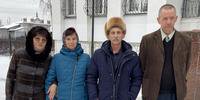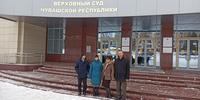The case of Martynov and Others in Alatyr
Filter
- #
Dmitry Baranov, Senior Forensic Investigator of the FSB of Russia for the Chuvash Republic, initiates a criminal case against unidentified persons who are suspected of violating Part 1 of Article 282.2 of the Criminal Code of the Russian Federation (organizing the activities of a banned organization).
- #
Residents of the city of Alatyr are being searched. Security officials suspect them of practicing the religion of Jehovah's Witnesses and interrogate at least seven believers.
- #
- #
The judge of the Leninsky District Court of Cheboksary, Yevgeny Egorov, having satisfied the request of the investigator Baranov, issues a search warrant in the apartment of Ivan Elagin. The believer is then interrogated.
- #
Searches are being conducted in the city of Kanasha (Chuvashia), located 100 kilometers north of Alatyr.
- #
Investigator Dmitry Baranov makes a decision to bring Andrey Martynov as a defendant in a criminal case. According to the investigation, the believer convened meetings, organized religious performances and services, and carried out preaching activities in order to spread the doctrine of Jehovah's Witnesses. Martynov is chosen a measure of restraint in the form of a written undertaking not to leave.
- #
Andrey Martynov is again charged with organizing the activities of an extremist organization (Part 1 of Article 282.2 of the Criminal Code of the Russian Federation).
An indictment is also issued to Nina Martynova. According to the investigation, by talking about the Bible to a certain "T. A. Ivanova", Martynova and Pavlova involved her in the activities of an extremist organization (part 1.1 of article 282.2 of the Criminal Code of the Russian Federation). At the same time, the presence of women at worship services, praying to God, singing Christian songs and discussing biblical issues with friends is equated by the investigator with participation in the activities of a banned organization (part 2 of article 282.2 of the Criminal Code of the Russian Federation).
Although believers are charged under different parts of Article 282.2 of the Criminal Code, the texts of the decisions to prosecute them are almost identical.
- #
Another defendant in the case, Zoya Pavlova, is formally charged.
- #
Investigator Dmitry Baranov brings Mikhail Yermakov as an accused and issues him a corresponding decision. Its text completely coincides with the accusation of Andrei Martynov.
The guilt of Martynov and Yermakov, according to the investigation, is that they "organized the holding of meetings ... consisting of the performance of songs ... and praying to Jehovah God, studying and discussing articles and religious texts."
- #
It becomes known that the case of four believers was submitted to the Alatyr District Court of the Chuvash Republic.
- #
25 people come to court to support believers. Andrey Martynov expresses his attitude to the charges.
The believer says: "The accusation is based on the decision of the Supreme Court of the Russian Federation of April 20, 2017, on the basis of which specific legal entities were liquidated. However, by this decision, the Supreme Court did not prohibit individuals from practicing the religion of Jehovah's Witnesses. Consequently, any person living in the Russian Federation has the right to practice this religion. And this means that being one of Jehovah's Witnesses in Russia is not a crime... I believe that the preliminary investigation bodies are incorrectly and arbitrarily interpreting the decision of the Supreme Court. And it is their misinterpretation, and not the alleged crime I committed, that is the reason why I am in the dock today."
The believer reminds the court that on June 7, 2022, the European Court of Human Rights declared illegal the liquidation of the Administrative Center of Jehovah's Witnesses and another 395 legal entities and decided to stop the criminal prosecution of believers in Russia and release the prisoners.
The prosecutor begins to present evidence.
- #
The prosecutor selectively reads out the evidence indicated in the case file.
- #
The meeting is attended by about 30 listeners. The court reproduces excerpts of video recordings of worship services of Jehovah's Witnesses, as well as cartoons based on biblical principles.
Also, some witnesses in the case are invited for questioning.
- #
The court continues to familiarize itself with material evidence: songs and videos of religious content.
- #
Since the secret witness does not appear at the hearing, the court reads out his preliminary testimony.
- #
The secret witness Ivanova is being interrogated. She recounts her preliminary testimony and reports that the defendants are unknown to her.
During the interrogation of the defendants, Zoya Pavlova confirms her written testimony only partially. She informs the court that the investigator put pressure on her and added some phrases to the protocol.
- #
The prosecutor asks the defendants for real terms: Andrey Martynov and Mikhail Ermakov for 6 years in prison, Nina Martynova - 5 years, and Zoya Pavlova - 4.5 years.
- #
Lawyers for the defendants emphasize that the defendants only enjoyed the right to freedom of religion. They refer to several arguments. Firstly, there is no objective and subjective side of the prosecution in the case - none of the witnesses has any claims against the defendants, and there are no victims. Secondly, the believers held peaceful worship services, not meetings of a religious organization. Thirdly, the testimony of the FSB officer confirms that "the defendants are not a structural unit" of the legal entity.
- #
The defendants describe how the Bible has helped them change for the better and that their peaceful religion has nothing to do with extremism. About 50 people are present in the courtroom during the speeches of believers.
The last word of the defendant Zoya Pavlova in Alatyr The last word of the defendant Nina Martynova in Alatyr The last word of the defendant Mikhail Yermakov in Alatyr The last word of the defendant Andrey Martynov in Alatyr - #
- #
The Supreme Court of the Chuvash Republic upholds the decision of the lower court.


